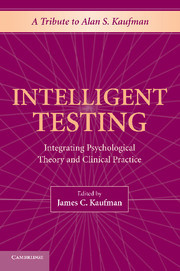Description
Intelligent Testing
Integrating Psychological Theory and Clinical Practice
Coordinator: Kaufman James C.
This tribute to Alan S. Kaufman is edited by his son James, with contributions by a 'who's who' in IQ testing.
Language: English
Subject for Intelligent Testing:
Intelligent Testing
Publication date: 09-2014
Support: Print on demand
Publication date: 09-2014
Support: Print on demand
Intelligent testing: integrating psychological theory and clinical practice
Publication date: 03-2009
264 p. · 16x23.5 cm · Hardback
Publication date: 03-2009
264 p. · 16x23.5 cm · Hardback
Description
/li>Contents
/li>Biography
/li>
The field of intelligence testing has been revolutionized by Alan S. Kaufman. He developed the Wechsler Intelligence Scale for Children?Revised (WISC-R) with David Wechsler, and his best-selling book, Intelligent Testing with the WISC-R, introduced the phrase 'intelligent testing'. Kaufman, with his wife, Nadeen, then created his own series of tests: the Kaufman Assessment Battery for Children (K-ABC), the Kaufman Test of Educational Achievement (K-TEA), the Kaufman Brief Intelligence Test (K-BIT), and many others. The K-ABC, the first major intelligence test to challenge the Wechsler, helped raise the bar for future tests. This is a celebration of his life's work, with contributions by a 'who's who' in IQ testing, including Bruce Bracken, Dawn Flanagan, Elaine Fletcher-Janzen, Randy Kamphaus, Nancy Mather, Steve McCallum, Jack Naglieri, Tom Oakland, Cecil Reynolds, and Robert Sternberg, is edited by his son James, and features essays expanding on his work and ideas from former colleagues.
Part I. Those Who Know Him: 1. Alan S. Kaufman's contributions Nadeen L. Kaufman; 2. Who is Alan S. Kaufman? Elizabeth O. Lichtenberger; 3. Alan S. Kaufman: the man and the professional Jennie Kaufman Singer; Part II. Intelligent Testing: 4. Intelligent testing: bridging the gap between Classical and Romantic science in assessment Elaine Fletcher-Janzen; 5. The intelligent testing of children with specific learning disabilities Nancy Mather; 6. Temperament preferences for children ages 8 through 17 in a nationally represented sample Kyle Bassett and Thomas Oakland; 7. Intelligent intelligence testing: the influence of Alan S. Kaufman Jack A. Naglieri; Part III. The Intersection of Theory and Measurement: 8. Kaufman on theory, measurement, interpretation, and fairness: a legacy in training, practice, and research Samuel O. Ortiz and Dawn P. Flanagan; 9. The theory of successful intelligence as a basis for new forms of ability testing at the high school, college, and graduate school levels Robert J. Sternberg; 10. Kaufman's work in the penumbra between measurement science and clinical assessment Randy W. Kamphaus and Cecil R. Reynolds; 11. Success is a latent variable: how Alan Kaufman shaped intelligence test theory, interpretation, and psychometrics with factor analysis Jason C. Cole; Part IV. Kaufman Across the World: 12. The K-ABC in France Claire Énéa-Drapeau and Michèle Carlier; 13. Dr. Alan Kaufman's contribution to Japan: K-ABC, intelligent testing, and school psychology Toshinori Ishikuma; 14. Alan Kaufman's deep influence in Sweden Jan Alm; 15. Intelligent testing of underserved populations R. Steve McCallum and Bruce A. Bracken.
James C. Kaufman, Ph.D., is an Associate Professor at the California State University at San Bernardino, where he directs the Learning Research Institute. Dr Kaufman's research focuses on the nurturance, structure, and assessment of creativity. Kaufman is the author or editor of 15 books either published or in press. These include Essentials of Creativity Assessment (with Jonathan Plucker and John Baer, 2008), International Handbook of Creativity (with Robert J. Sternberg, Cambridge University Press, 2006), and Applied Intelligence (with Robert J. Sternberg and Elena Grigorenko, Cambridge University Press, 2008). His research has been featured on CNN, NPR, the New York Times, and the BBC. Kaufman is a founding co-editor of the official journal for APA's Division 10, Psychology, Aesthetics, and the Arts. He is also the associate editor of the Journal of Creativity Behavior and the incoming editor of the International Journal of Creativity and Problem Solving and is the series editor of the Psych 101 series. He received the 2003 Daniel E. Berlyne Award from APA's Division 10, as well as NAGC's E. Paul Torrance Award.
© 2024 LAVOISIER S.A.S.
These books may interest you

Essentials of WAIS-IV Assessment 59.12 €



